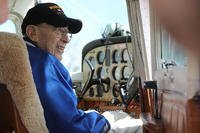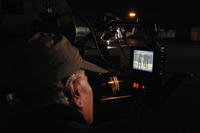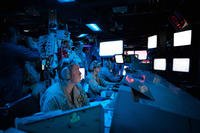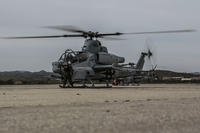It has been more than a year since the tragic apparent suicide of 20-year-old recruit Raheel Siddiqui in March 2016 shone a spotlight on allegations of hazing at Marine Corps Recruit Depot Parris Island, the Corps' oldest and most famous boot camp.
Three different investigations, made public last summer, would substantiate drill instructor misconduct, not only in Siddiqui's case, but also in a variety of other incidents, including an episode in which another Muslim recruit was allegedly stuffed into a dryer in a late-night interrogation.
When Brig. Gen. Austin Renforth took command of the base and the Marine Corps' eastern recruiting region last June, a "cloud" of suspicion and scandal still hung over the depot, he told Military.com in an interview this week. Since then, he said, he has practiced what he calls LBWA, leadership by walking around, and implemented new disciplinary policies and oversight procedures in an effort to create a culture of complete trust and accountability within the institution.
Although disciplinary measures are ongoing -- five drill instructors await court-martial proceedings, one has been acquitted at trial, and a number of drill instructors and officers are pending action -- Renforth said he took great pleasure in putting two of the 15 drill instructors sidelined in the investigations back to work, after the prosecuting authority found they were free of wrongdoing.
Renforth didn't say what information exactly led officials to clear the two drill instructors in question of any wrongdoing, but he did say the command "cast a pretty wide net" in sidelining DIs.
"I actually individually, personally, handed them their campaign cover back. And they cried like babies on me," he said of the two returned to duty. "It was really emotional. I'm sort of getting caught up thinking about it."
Renforth said he returned the two drill instructors to their jobs around February, meaning they had spent some seven months on the base performing tasks unrelated to training recruits and awaiting their fate.
"Think about how that disrupts their life. These guys both were fathers, husbands, who were caught up in this," Renforth said. "What I really gave them credit for, is during the whole time they were going through this process ... they worked really hard. We gave them jobs outside of being a drill instructor. They came to work every day, they worked really hard. And that's why I felt really proud to go back and tell them they could be a drill instructor."
While Renforth said he has not made sweeping changes to boot camp since taking charge, he has worked to make guidance more precise, and training and disciplinary practices standardized so that recruits get the same experience regardless of which depot or unit they are assigned to. He has installed an additional series commander position to provide increased oversight, removed words such as "approximately" from training regulations to cut out ambiguity, and changed certain job titles to align with their Marine Corps fleet equivalents.
"They're called command duty officers, they're not called early/late check officers," Renforth said. "It may sound minor, but we're trying to teach here the processes that we would still use out in the fleet, out in the operating forces. So I don't want to create a different lexicon just because I'm in the recruit training environment."
Every case of alleged drill instructor misconduct now lands on his desk, Renforth said. And the leadership of all four recruit training battalions are brought in to consult on these cases to ensure that punishments meted out are equitable and consistent.
"So I don't want one battalion to give you a slap on the wrist for misconduct, and another battalion to do non-judicial punishment and relieve you for cause," he said. "I think it's important to have consistency across the entire depot on how these violations are handled. And that can only be done by coming up through me."
Since last June, he said, three new instances of hazing have been substantiated at Parris Island, a figure he characterized as a stark decrease, not only from last year but other prior years. One drill instructor was given non-judicial punishment and relieved for cause; two others were given administrative counselings, which enter their records and typically affect career and promotion prospects.
Renforth said he tries to assess whether a drill instructor is "coachable" and if abusive or overly aggressive behavior represents only a mistake, or a failing of character. Renforth, a 30-year infantry officer and former member of the Marine Corps rugby team, calls himself the "head coach" of Parris Island, illustrating his approach to oversight and discipline.
Drill instructors know they operate in a "fishbowl," Renforth said, and he wants them to know he has their back. In the Corps' famously gritty and stringent recruit training pipeline, drill instructors are asked to navigate the line between breaking recruits down and abusing them.
"We don't want to have knee-jerk reactions where we have the drill instructors afraid that anything that happens, they're gone," he said. "What I'm looking for is those young men and women out there who don't get it, who just don't understand, who aren't coachable. I always tell them, as the head coach, if I don't think you're coachable, I'm going to cut you."
At the same time, Renforth wants them to know what's at stake. Last year's hazing scandals have prompted congressional inquiries, and the investigation into Siddiqui's death strongly suggested his treatment at the hands of a senior drill instructor prompted his tragic actions.
"They need to understand that the strategic impact: One shortcoming of one drill instructor could potentially fundamentally change how we make Marines," he said. "I just explain that to them."
While the incidents outlined in last year's hazing investigations all took place within 3rd Recruit Training Battalion -- reportedly known by insiders as Thumping Third -- and revealed several shocking incidents in which recruits appeared to be singled out by their drill instructors based on their race or religion, Renforth said he doesn't believe a cultural problem exists within a battalion or the depot as a whole.
There are 600 drill instructors within the depot, and 150 within Third Battalion alone, he said. Every year, forty-four recruit graduations take place and, every few months, a new group of drill instructors arrives at boot camp.
"I don't see this as a Third Battalion issue," Renforth said. "I see this as something that we have to address across the depot, and it certainly wasn't systemic, not at all. I think it was a few select individuals who, at the end of the day, there has to be some personal accountability. They knew right from wrong. The rules haven't changed."
In a conversation with Renforth, recruits themselves are discussed only briefly. His philosophy is clear: Train the DIs right and hold them accountable, and the recruits will be fine. But even in the thick of the scandal, he said, he has never detected doubts or anxiety from parents sending their children to be made into Marines.
"Never once have I had one family member even be remotely concerned about their son or daughter. I actually expected it," Renforth said. "You know, I expected to be fielding questions like, 'Hey, is my son going to be OK, is he going to be all right?' But there's nothing but just complete pride about their son or daughter."
In just a year, Renforth said he's noticed a difference in the atmosphere at Parris Island. Senior enlisted Marines who served a tour at the depot earlier in their careers have asked to come back to the drill field as gunnery sergeants and first sergeants, he said. As the son of a Marine who graduated from boot camp at Parris Island in 1942, Renforth said he gets the history and the legacy that make the place special.
"That name resonates with people, Parris Island," he said. "You do a tour at Parris Island, you go back into the operating forces, people know you've earned something and you're a better Marine for having been there."
-- Hope Hodge Seck can be reached at hope.seck@military.com. Follow her on Twitter at@HopeSeck.































